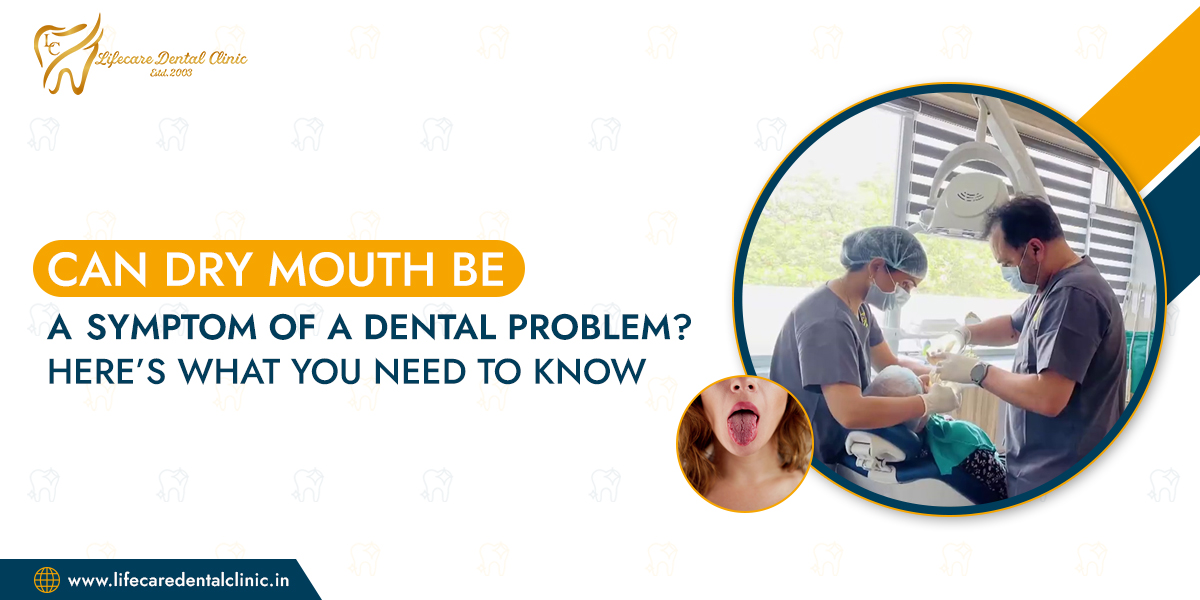You wake up feeling parched, sipping water all day, and maybe even struggling to speak clearly or swallow comfortably. Sounds familiar? We agree, dry mouth is uncomfortable. But here’s the thing: dry mouth isn’t just an annoying inconvenience. It can actually be a sign of an underlying dental issue—or even lead to one.
At Lifecare Dental Clinic, our tricity patients often ask us: “Is dry mouth something to worry about?” The short answer? Yes, sometimes it is. And knowing when to take it seriously can make all the difference in protecting your smile.
So let’s break it down, plain and simple—what dry mouth really means, why it happens, and when to book an appointment with an expert dental team in Tricity.
What Is Dry Mouth, Really?
Dry mouth, or xerostomia, happens when your salivary glands don’t produce enough saliva. While it might not sound like a big deal, saliva actually plays a superhero role in your oral health. It helps:
- Wash away food particles and bacteria
- Neutralize acids in your mouth
- Keep your gums and teeth hydrated
- Start the digestive process
Without enough saliva, your mouth becomes a playground for harmful bacteria, which can lead to bad breath, tooth decay, gum disease, and even infections.
Common Causes of Dry Mouth
Dry mouth isn’t always about dental problems—it can also be linked to lifestyle, medications, or medical conditions. Here are some common culprits:
Medications
Antidepressants, antihistamines, blood pressure meds, and others can reduce saliva production.
Dehydration
Not drinking enough water, especially in hot climates or during illness, can dry out your mouth fast.
Health Conditions
Diabetes, Sjögren’s syndrome, or autoimmune disorders can all affect saliva glands.
Smoking or Alcohol Use
Both can interfere with saliva flow and irritate oral tissues.
Mouth Breathing
Breathing through your mouth, especially while sleeping, can lead to dryness.
But here’s where it gets tricky—sometimes dry mouth is the first sign of a bigger dental issue. That’s where your trusted dentist in Tricity steps in.
When Dry Mouth Signals a Dental Problem?
While not every case of dry mouth means trouble, persistent dryness can point to or cause dental problems such as:
1. Tooth Decay
Without saliva to wash away food and neutralize acids, your teeth are more vulnerable to decay—even if you brush regularly. If you’ve noticed more cavities than usual, dry mouth might be part of the reason.
2. Gum Disease
A dry environment allows plaque to build up faster, which can irritate your gums and lead to gingivitis or more severe periodontal disease.
3. Mouth Sores or Infections
Fungal infections like oral thrush thrive in dry mouths, especially if your immune system is compromised or you're wearing dentures.
4. Difficulty Wearing Dentures
If you wear dentures, dry mouth can make them uncomfortable or cause them to rub against your gums, leading to sores or infections.
At Lifecare Dental Clinic, we take a comprehensive approach to dry mouth, identifying both the cause and any resulting dental issues. We help in solving the root of the problem, not just treating the symptoms.
What to Expect When You Visit a Dentist in Tricity?
If you’re dealing with persistent dry mouth, it’s time to schedule a visit. Here’s what we usually do:
Full Oral Exam
We check for signs of decay, gum disease, or infections.
Medical History Review
We’ll look at your current medications and health conditions that might be contributing.
Saliva Flow Tests
These help us understand how well your glands are functioning.
Customized Treatment Plan
Depending on the cause, we may recommend lifestyle changes, prescription mouthwashes, or other targeted solutions.
The best dentist in Tricity at Lifecare Dental Clinic doesn't believe in one-size-fits-all answers. We tailor your treatment to you—because no two mouths (or patients) are exactly alike.
How to Manage Dry Mouth at Home?
While seeing a professional is essential, here are a few things you can do to ease dry mouth symptoms on your own:
Stay Hydrated
Sip water throughout the day, especially before bed.
Chew Sugar-Free Gum or Lozenges
These can stimulate saliva production.
Use a Humidifier
Especially at night, to keep your airways moist.
Avoid Alcohol, Caffeine, and Tobacco
All of which can worsen dry mouth.
Switch to a Dry-Mouth-Friendly Toothpaste
Some products are specifically designed to help.
But remember—these are short-term relief options. For long-term solutions, your dentist in is the best person to help.
Final Thoughts: Don’t Ignore the Signs
Dry mouth might seem harmless at first, but if left unchecked, it can spiral into more serious oral health issues. If you’ve been constantly sipping water, waking up with a dry throat, or noticing more dental problems lately, don’t brush it off.
Reach out to a reliable Dental Clinic in Tricity where experts evaluate what’s really going on. You deserve to feel comfortable, confident, and pain-free—and that starts with addressing even the smallest symptoms before they become big problems.
Need Help?
Book your consultation today with the top-rated dentists in Tricity by calling on +918591297780 or you can whatsapp here to take the first step toward lasting oral health. We’re here to help your smile shine—hydrated and healthy!


Leave A Reply